ACC220 Law of Business Associations - Week 12 Assignment
VerifiedAdded on 2023/06/03
|6
|1008
|193
Homework Assignment
AI Summary
This assignment analyzes three key scenarios within the realm of business associations. The first section examines a dispute over unpaid dividends, referencing the Corporations Act 2001 (Cth) and shareholder rights, including the legal implications of salary adjustments and share sales. The second part addresses the restructuring of a company facing cash flow problems, focusing on the responsibilities of managing directors, the importance of paying rents, and adherence to the Corporations Act. The final section explores a case involving a statutory demand due to lack of service quality, discussing the legal consequences of inferior service and the ability of a company to dispute payment based on these grounds. The assignment provides a detailed analysis of the legal principles and potential outcomes in each scenario.
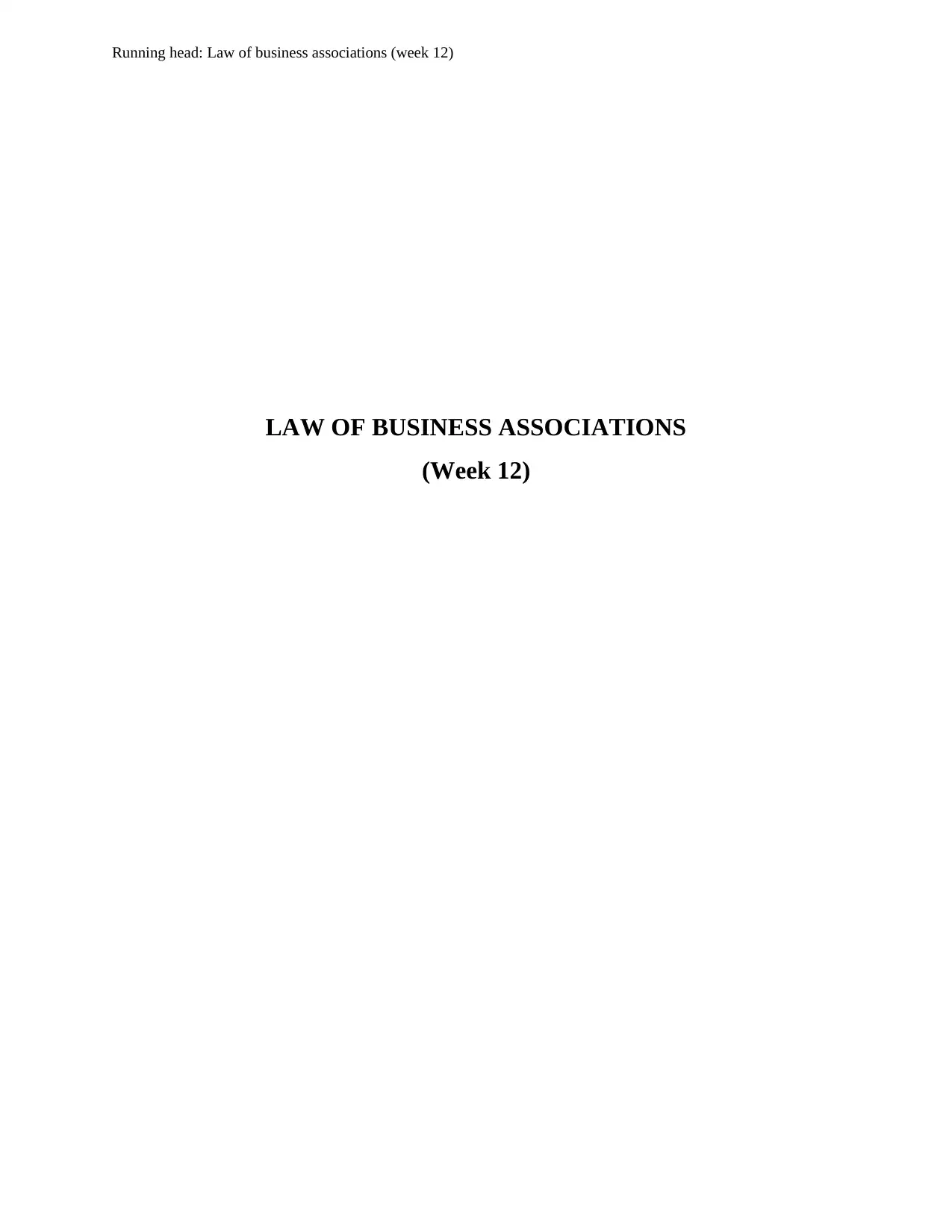
Running head: Law of business associations (week 12)
LAW OF BUSINESS ASSOCIATIONS
(Week 12)
LAW OF BUSINESS ASSOCIATIONS
(Week 12)
Paraphrase This Document
Need a fresh take? Get an instant paraphrase of this document with our AI Paraphraser
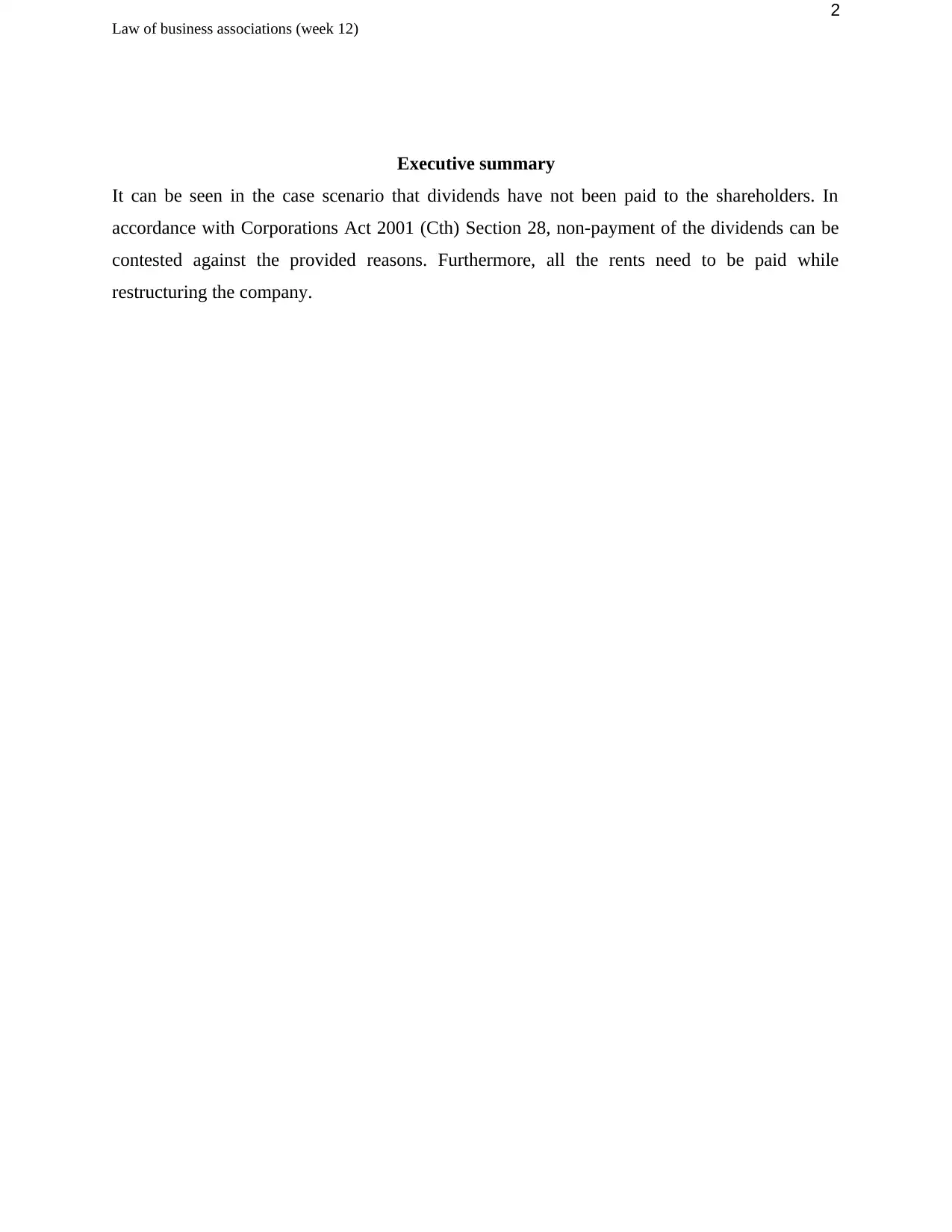
2
Law of business associations (week 12)
Executive summary
It can be seen in the case scenario that dividends have not been paid to the shareholders. In
accordance with Corporations Act 2001 (Cth) Section 28, non-payment of the dividends can be
contested against the provided reasons. Furthermore, all the rents need to be paid while
restructuring the company.
Law of business associations (week 12)
Executive summary
It can be seen in the case scenario that dividends have not been paid to the shareholders. In
accordance with Corporations Act 2001 (Cth) Section 28, non-payment of the dividends can be
contested against the provided reasons. Furthermore, all the rents need to be paid while
restructuring the company.
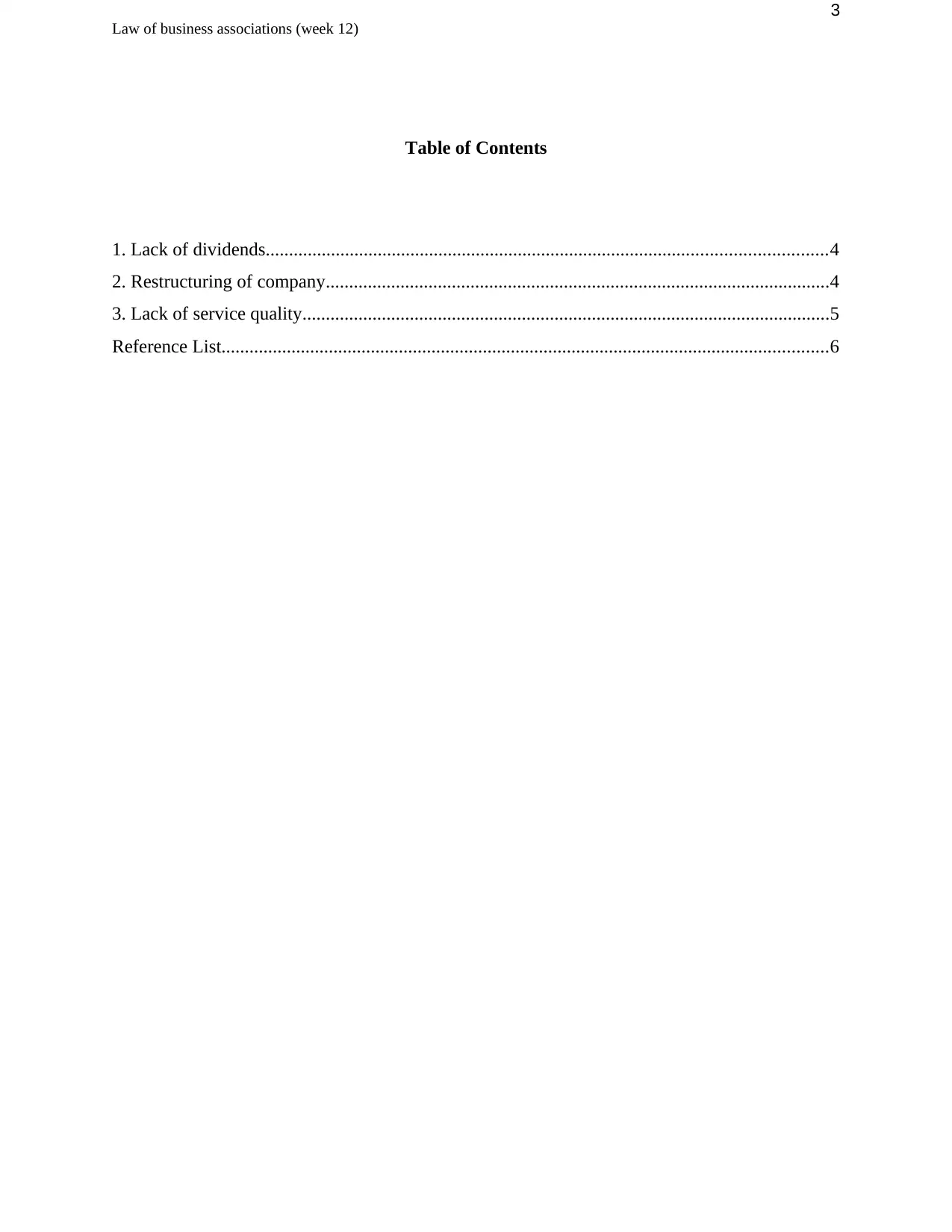
3
Law of business associations (week 12)
Table of Contents
1. Lack of dividends........................................................................................................................4
2. Restructuring of company............................................................................................................4
3. Lack of service quality.................................................................................................................5
Reference List..................................................................................................................................6
Law of business associations (week 12)
Table of Contents
1. Lack of dividends........................................................................................................................4
2. Restructuring of company............................................................................................................4
3. Lack of service quality.................................................................................................................5
Reference List..................................................................................................................................6
⊘ This is a preview!⊘
Do you want full access?
Subscribe today to unlock all pages.

Trusted by 1+ million students worldwide
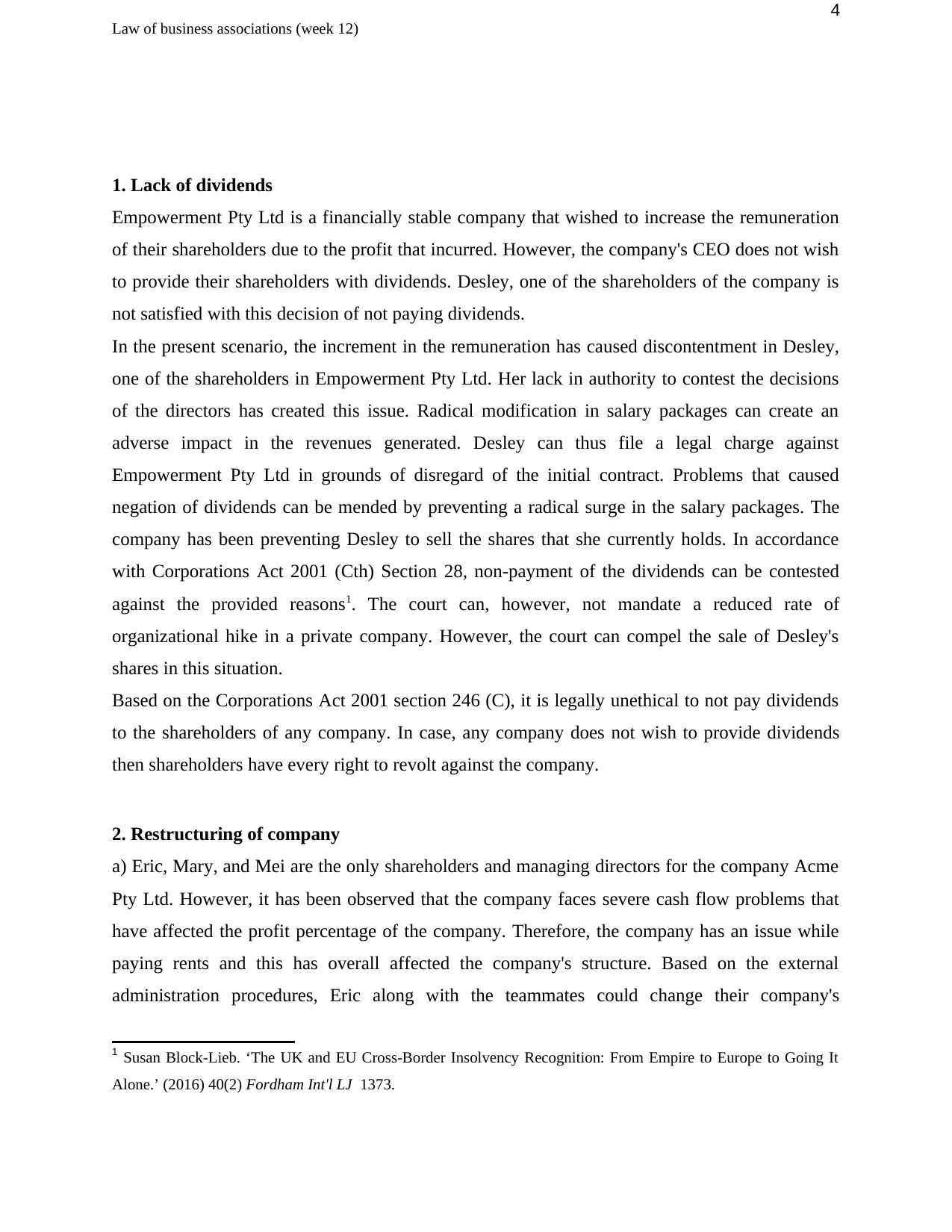
4
Law of business associations (week 12)
1. Lack of dividends
Empowerment Pty Ltd is a financially stable company that wished to increase the remuneration
of their shareholders due to the profit that incurred. However, the company's CEO does not wish
to provide their shareholders with dividends. Desley, one of the shareholders of the company is
not satisfied with this decision of not paying dividends.
In the present scenario, the increment in the remuneration has caused discontentment in Desley,
one of the shareholders in Empowerment Pty Ltd. Her lack in authority to contest the decisions
of the directors has created this issue. Radical modification in salary packages can create an
adverse impact in the revenues generated. Desley can thus file a legal charge against
Empowerment Pty Ltd in grounds of disregard of the initial contract. Problems that caused
negation of dividends can be mended by preventing a radical surge in the salary packages. The
company has been preventing Desley to sell the shares that she currently holds. In accordance
with Corporations Act 2001 (Cth) Section 28, non-payment of the dividends can be contested
against the provided reasons1. The court can, however, not mandate a reduced rate of
organizational hike in a private company. However, the court can compel the sale of Desley's
shares in this situation.
Based on the Corporations Act 2001 section 246 (C), it is legally unethical to not pay dividends
to the shareholders of any company. In case, any company does not wish to provide dividends
then shareholders have every right to revolt against the company.
2. Restructuring of company
a) Eric, Mary, and Mei are the only shareholders and managing directors for the company Acme
Pty Ltd. However, it has been observed that the company faces severe cash flow problems that
have affected the profit percentage of the company. Therefore, the company has an issue while
paying rents and this has overall affected the company's structure. Based on the external
administration procedures, Eric along with the teammates could change their company's
1 Susan Block-Lieb. ‘The UK and EU Cross-Border Insolvency Recognition: From Empire to Europe to Going It
Alone.’ (2016) 40(2) Fordham Int'l LJ 1373.
Law of business associations (week 12)
1. Lack of dividends
Empowerment Pty Ltd is a financially stable company that wished to increase the remuneration
of their shareholders due to the profit that incurred. However, the company's CEO does not wish
to provide their shareholders with dividends. Desley, one of the shareholders of the company is
not satisfied with this decision of not paying dividends.
In the present scenario, the increment in the remuneration has caused discontentment in Desley,
one of the shareholders in Empowerment Pty Ltd. Her lack in authority to contest the decisions
of the directors has created this issue. Radical modification in salary packages can create an
adverse impact in the revenues generated. Desley can thus file a legal charge against
Empowerment Pty Ltd in grounds of disregard of the initial contract. Problems that caused
negation of dividends can be mended by preventing a radical surge in the salary packages. The
company has been preventing Desley to sell the shares that she currently holds. In accordance
with Corporations Act 2001 (Cth) Section 28, non-payment of the dividends can be contested
against the provided reasons1. The court can, however, not mandate a reduced rate of
organizational hike in a private company. However, the court can compel the sale of Desley's
shares in this situation.
Based on the Corporations Act 2001 section 246 (C), it is legally unethical to not pay dividends
to the shareholders of any company. In case, any company does not wish to provide dividends
then shareholders have every right to revolt against the company.
2. Restructuring of company
a) Eric, Mary, and Mei are the only shareholders and managing directors for the company Acme
Pty Ltd. However, it has been observed that the company faces severe cash flow problems that
have affected the profit percentage of the company. Therefore, the company has an issue while
paying rents and this has overall affected the company's structure. Based on the external
administration procedures, Eric along with the teammates could change their company's
1 Susan Block-Lieb. ‘The UK and EU Cross-Border Insolvency Recognition: From Empire to Europe to Going It
Alone.’ (2016) 40(2) Fordham Int'l LJ 1373.
Paraphrase This Document
Need a fresh take? Get an instant paraphrase of this document with our AI Paraphraser
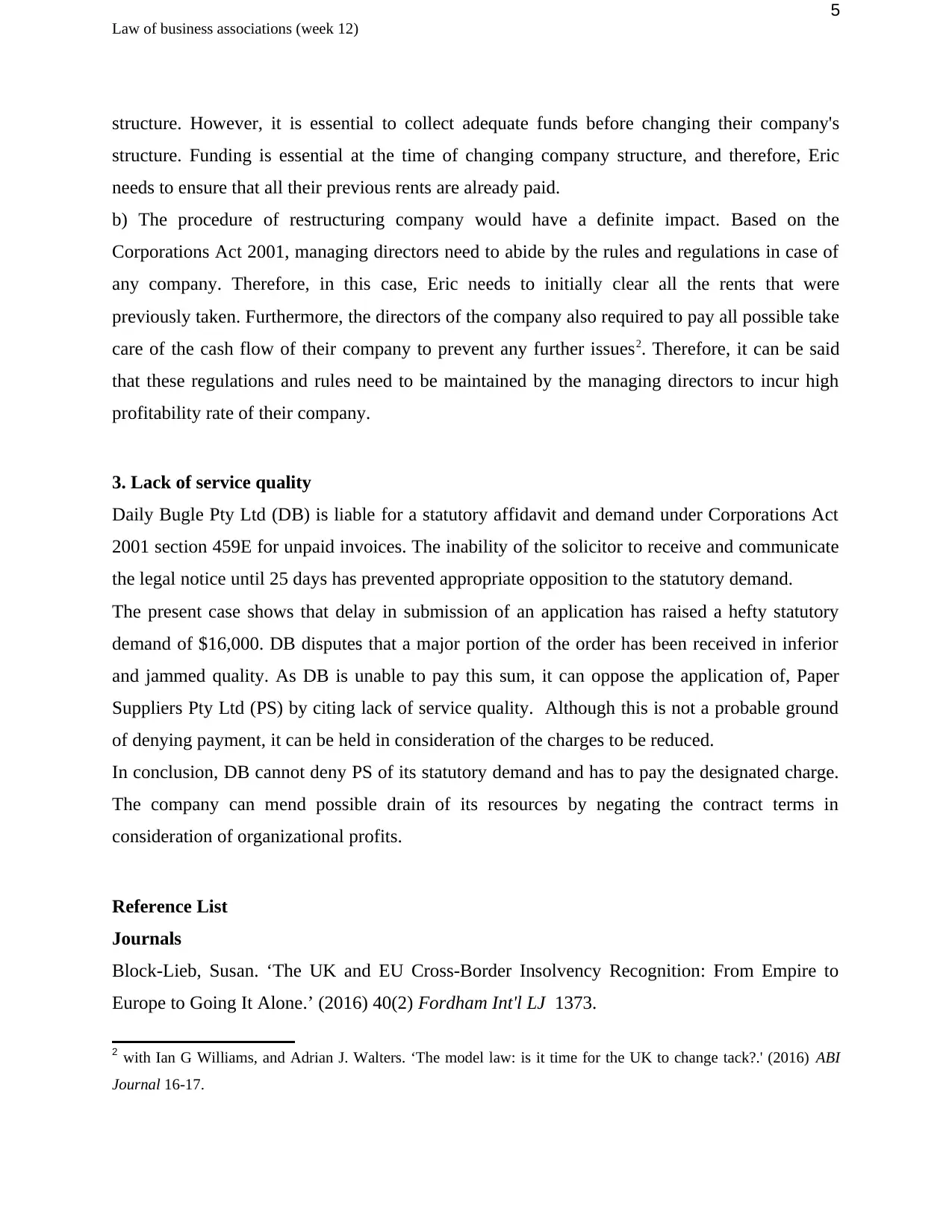
5
Law of business associations (week 12)
structure. However, it is essential to collect adequate funds before changing their company's
structure. Funding is essential at the time of changing company structure, and therefore, Eric
needs to ensure that all their previous rents are already paid.
b) The procedure of restructuring company would have a definite impact. Based on the
Corporations Act 2001, managing directors need to abide by the rules and regulations in case of
any company. Therefore, in this case, Eric needs to initially clear all the rents that were
previously taken. Furthermore, the directors of the company also required to pay all possible take
care of the cash flow of their company to prevent any further issues2. Therefore, it can be said
that these regulations and rules need to be maintained by the managing directors to incur high
profitability rate of their company.
3. Lack of service quality
Daily Bugle Pty Ltd (DB) is liable for a statutory affidavit and demand under Corporations Act
2001 section 459E for unpaid invoices. The inability of the solicitor to receive and communicate
the legal notice until 25 days has prevented appropriate opposition to the statutory demand.
The present case shows that delay in submission of an application has raised a hefty statutory
demand of $16,000. DB disputes that a major portion of the order has been received in inferior
and jammed quality. As DB is unable to pay this sum, it can oppose the application of, Paper
Suppliers Pty Ltd (PS) by citing lack of service quality. Although this is not a probable ground
of denying payment, it can be held in consideration of the charges to be reduced.
In conclusion, DB cannot deny PS of its statutory demand and has to pay the designated charge.
The company can mend possible drain of its resources by negating the contract terms in
consideration of organizational profits.
Reference List
Journals
Block-Lieb, Susan. ‘The UK and EU Cross-Border Insolvency Recognition: From Empire to
Europe to Going It Alone.’ (2016) 40(2) Fordham Int'l LJ 1373.
2 with Ian G Williams, and Adrian J. Walters. ‘The model law: is it time for the UK to change tack?.' (2016) ABI
Journal 16-17.
Law of business associations (week 12)
structure. However, it is essential to collect adequate funds before changing their company's
structure. Funding is essential at the time of changing company structure, and therefore, Eric
needs to ensure that all their previous rents are already paid.
b) The procedure of restructuring company would have a definite impact. Based on the
Corporations Act 2001, managing directors need to abide by the rules and regulations in case of
any company. Therefore, in this case, Eric needs to initially clear all the rents that were
previously taken. Furthermore, the directors of the company also required to pay all possible take
care of the cash flow of their company to prevent any further issues2. Therefore, it can be said
that these regulations and rules need to be maintained by the managing directors to incur high
profitability rate of their company.
3. Lack of service quality
Daily Bugle Pty Ltd (DB) is liable for a statutory affidavit and demand under Corporations Act
2001 section 459E for unpaid invoices. The inability of the solicitor to receive and communicate
the legal notice until 25 days has prevented appropriate opposition to the statutory demand.
The present case shows that delay in submission of an application has raised a hefty statutory
demand of $16,000. DB disputes that a major portion of the order has been received in inferior
and jammed quality. As DB is unable to pay this sum, it can oppose the application of, Paper
Suppliers Pty Ltd (PS) by citing lack of service quality. Although this is not a probable ground
of denying payment, it can be held in consideration of the charges to be reduced.
In conclusion, DB cannot deny PS of its statutory demand and has to pay the designated charge.
The company can mend possible drain of its resources by negating the contract terms in
consideration of organizational profits.
Reference List
Journals
Block-Lieb, Susan. ‘The UK and EU Cross-Border Insolvency Recognition: From Empire to
Europe to Going It Alone.’ (2016) 40(2) Fordham Int'l LJ 1373.
2 with Ian G Williams, and Adrian J. Walters. ‘The model law: is it time for the UK to change tack?.' (2016) ABI
Journal 16-17.

6
Law of business associations (week 12)
Williams, Ian G., and Adrian J. Walters. ‘The model law: is it time for the UK to change tack?.'
(2016) ABI Journal 16-17.
Law of business associations (week 12)
Williams, Ian G., and Adrian J. Walters. ‘The model law: is it time for the UK to change tack?.'
(2016) ABI Journal 16-17.
⊘ This is a preview!⊘
Do you want full access?
Subscribe today to unlock all pages.

Trusted by 1+ million students worldwide
1 out of 6
Related Documents
Your All-in-One AI-Powered Toolkit for Academic Success.
+13062052269
info@desklib.com
Available 24*7 on WhatsApp / Email
![[object Object]](/_next/static/media/star-bottom.7253800d.svg)
Unlock your academic potential
Copyright © 2020–2025 A2Z Services. All Rights Reserved. Developed and managed by ZUCOL.



